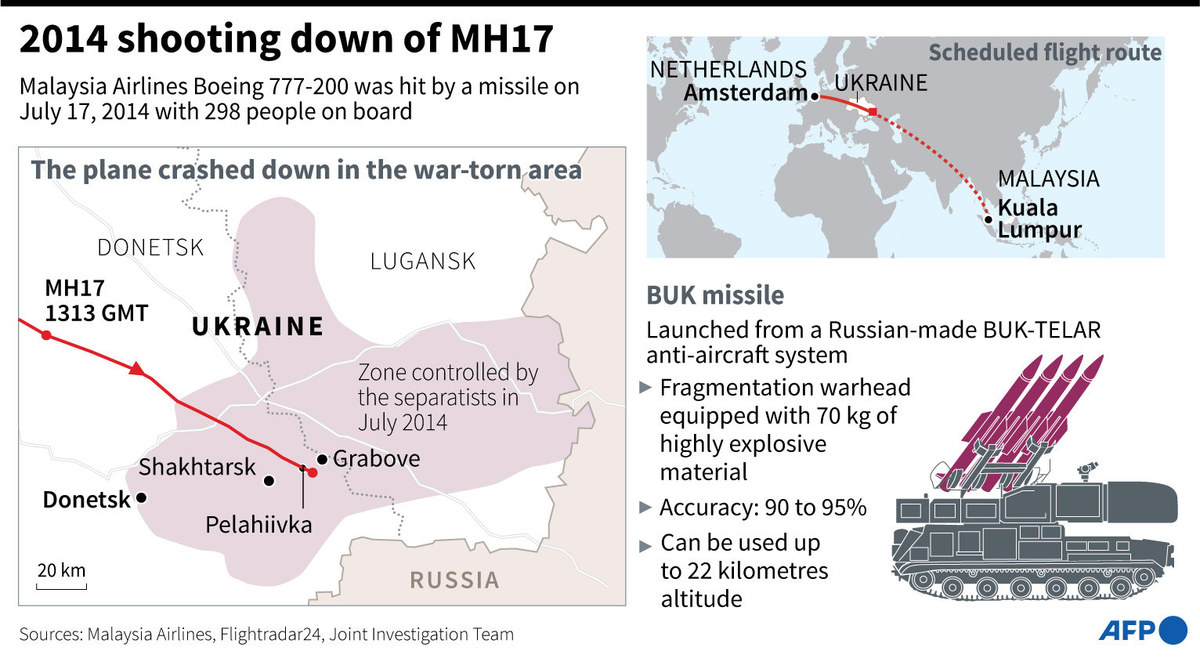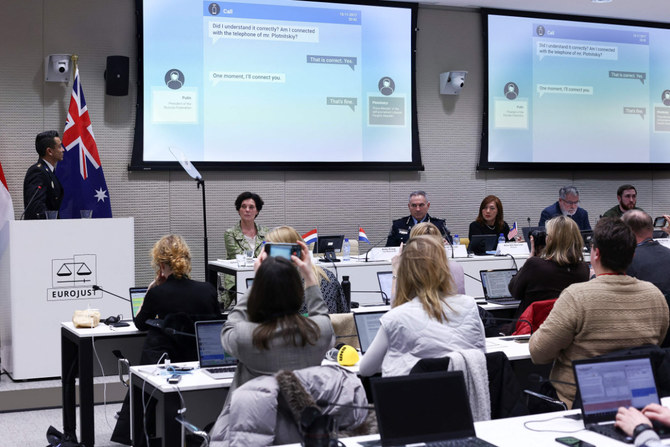THE HAGUE, Netherlands: An international team of investigators said Wednesday it found “strong indications” that Russian President Vladimir Putin approved the supply of heavy anti-aircraft weapons to Ukrainian separatists who shot down Malaysia Airlines Flight 17 in 2014 with a Russian missile.
However, members of the Joint Investigation Team said they had insufficient evidence to prosecute Putin or any other suspects and they suspended their 8½-year inquiry into the shooting down that killed all 298 people on board the Boeing 777 flying from Amsterdam to Kuala Lumpur.
Russia has always denied any involvement in the downing of the flight over eastern Ukraine on July 17, 2014, and refused to cooperate with the international investigation.
Dutch prosecutors said that “there are strong indications that the Russian president decided on supplying” a Buk missile system — the weapon that downed MH17 — to Ukrainian separatists.
“Although we speak of strong indications, the high bar of complete and conclusive evidence is not reached,” Dutch prosecutor Digna van Boetzelaer said, adding that without Russian cooperation, “the investigation has now reached its limit. All leads have been exhausted.”
She also said that, as head of state, Putin would have immunity from prosecution in the Netherlands. The team played a recording of an intercepted phone call in which they said Putin could be heard discussing the conflict in eastern Ukraine.
“Are we disappointed? No, because we think we came further than we had ever thought in 2014. Would we have liked to come further? Of course, yes,” said Andy Kraag of the Dutch police.

The team informed relatives of those killed in the downing of MH17 of their findings before making them public.
“There was disappointment because ... they wanted to know why MH17 was shot down,” Kraag said. “We’re really clear on what has happened, but the answer to the question why MH17 was shot down still remains in Russia.”
Van Boetzelaer said that while the investigation is being suspended, phone lines will remain open for possible witnesses who may still want to provide evidence. If that happens, the inquiry could be reactivated.
Russian officials say that a decision to provide rebels with military support over the summer of 2014 was in Putin’s hands.
A decision to supply arms was even postponed for a week “because there is only one who makes a decision (…), the person who is currently at a summit in France,” the investigative team said, citing a phone conversation that was referring to Putin.
Prosecutors said that at the time Putin was at a commemoration of D-Day in France.
The announcement by the investigative team comes nearly three months after a Dutch court convicted two Russians and a Ukrainian rebel for their roles in shooting down the plane. One Russian was acquitted by the court.
None of the suspects appeared for the trial and it was unclear if the three who were found guilty of multiple murders will ever serve their sentences.
The convictions and the court’s finding that the surface-to-air Buk missile came from a Russian military base were seen as a clear indication that Moscow had a role in the tragedy. Russia has always denied involvement. The Russian Foreign Ministry accused the court in November of bowing to pressure from Dutch politicians, prosecutors and the news media.
But the November convictions held that Moscow was in overall control in 2014 over the self-proclaimed Donetsk People’s Republic, the separatist area of eastern Ukraine where the missile was launched. The Buk missile system came from the Russian military’s 53rd Anti-Aircraft Missile Brigade, based in the city of Kursk.
The Joint Investigation Team is made up of experts from the Netherlands, Australia, Malaysia, Belgium and Ukraine. Most of the victims were Dutch. It had continued to investigate the crew of the missile system that brought down the plane and those who ordered its deployment in Ukraine.
As well as the criminal trial that was held in the Netherlands, the Dutch and Ukrainian governments are suing Russia at the European Court of Human Rights over its alleged role in the downing of MH17.
The findings revealed Wednesday will likely strengthen the case at the human rights court and could also be used by prosecutors at the International Criminal Court who are investigating possible war crimes in Ukraine dating to the start of the separatist conflict.
Australian Prime Minister Anthony Albanese vowed to keep pursuing justice for 38 Australian citizens and residents who died aboard MH17, describing Putin as “reprehensible.”
“The shooting down of MH17 was an act of terrorism that had an impact here in Australia but on many countries as well. And we will continue to pursue these issues with every avenue at our disposal,” Albanese said in the Australian capital Canberra.
“This is a guy who runs an authoritarian regime, that doesn’t care about human rights, that doesn’t care about devastation of communities — whether it be in Ukraine, whether it be the oppression of his own citizens, or whether it be acts outside of Russia, of which we’ve seen a number,” Albanese added.
















